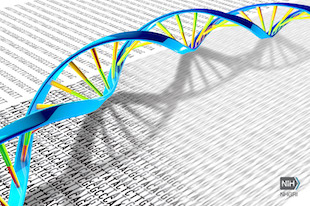 NHGRI, DARRYL LEJAMost genomic studies to date have focused on linking mutations to diseases. Taking a new approach, researchers studying the genomes of apparently healthy individuals identified some people who seem to be resilient to severe genetic disorders that are known to crop up during childhood. Of the 589,306 human genomes they analyzed, researchers from the Icahn School of Medicine at Mount Sinai in New York City and their colleagues identified 13 people who carry mutations for certain genetic disorders but do not appear to have the associated diseases, according to a study published today (April 11) in Nature Biotechnology.
NHGRI, DARRYL LEJAMost genomic studies to date have focused on linking mutations to diseases. Taking a new approach, researchers studying the genomes of apparently healthy individuals identified some people who seem to be resilient to severe genetic disorders that are known to crop up during childhood. Of the 589,306 human genomes they analyzed, researchers from the Icahn School of Medicine at Mount Sinai in New York City and their colleagues identified 13 people who carry mutations for certain genetic disorders but do not appear to have the associated diseases, according to a study published today (April 11) in Nature Biotechnology.
“It’s a really interesting study because what we consider pathogenic [is] not necessarily the case,” Eric Topol, the director of the Scripps Translational Science Institute who was not involved with the study, told The Scientist. There have been several reports of people with severe, pathogenic mutations who did not show signs of the disease. “What’s new here is they took a systematic approach,” Topol said.
“If you wanted to find clues to prevention,” study coauthor Stephen Friend, president of the nonprofit Sage Bionetworks and a geneticist Mount Sinai, said during a press briefing, “instead of looking at people with disease, you would want to look at individuals who should have gotten sick.”
For the present study, Friend and colleagues analyzed existing data from 12 genetic ...













